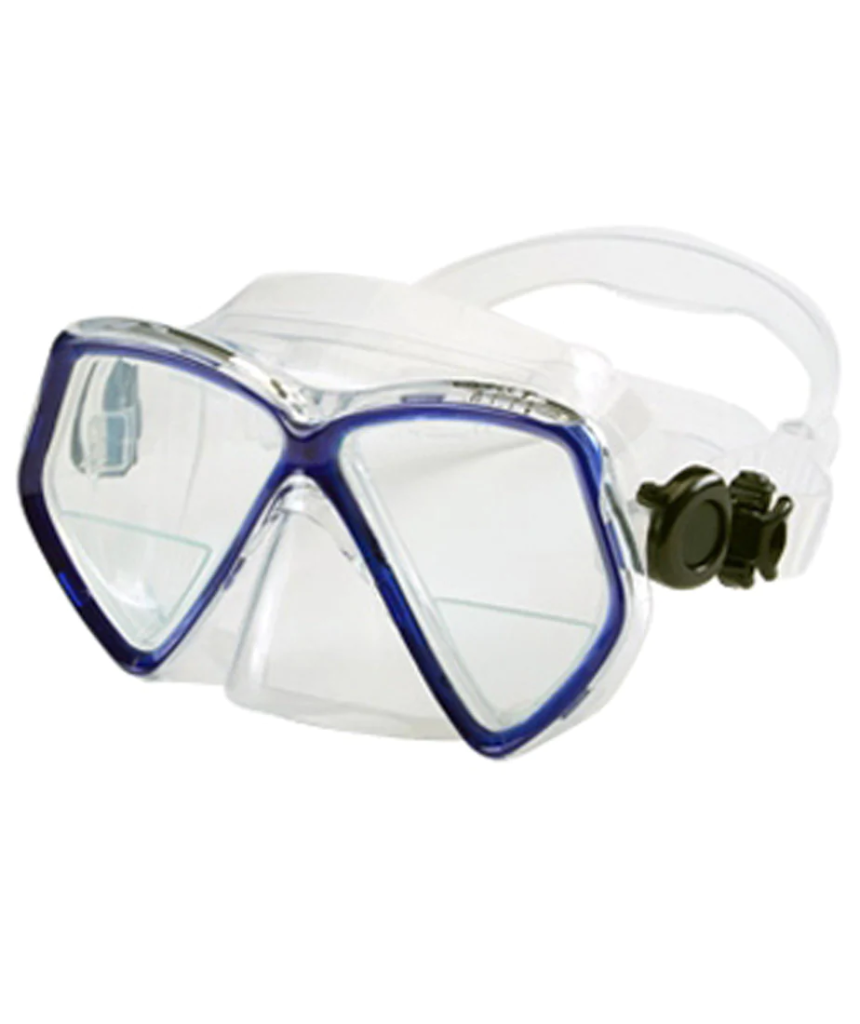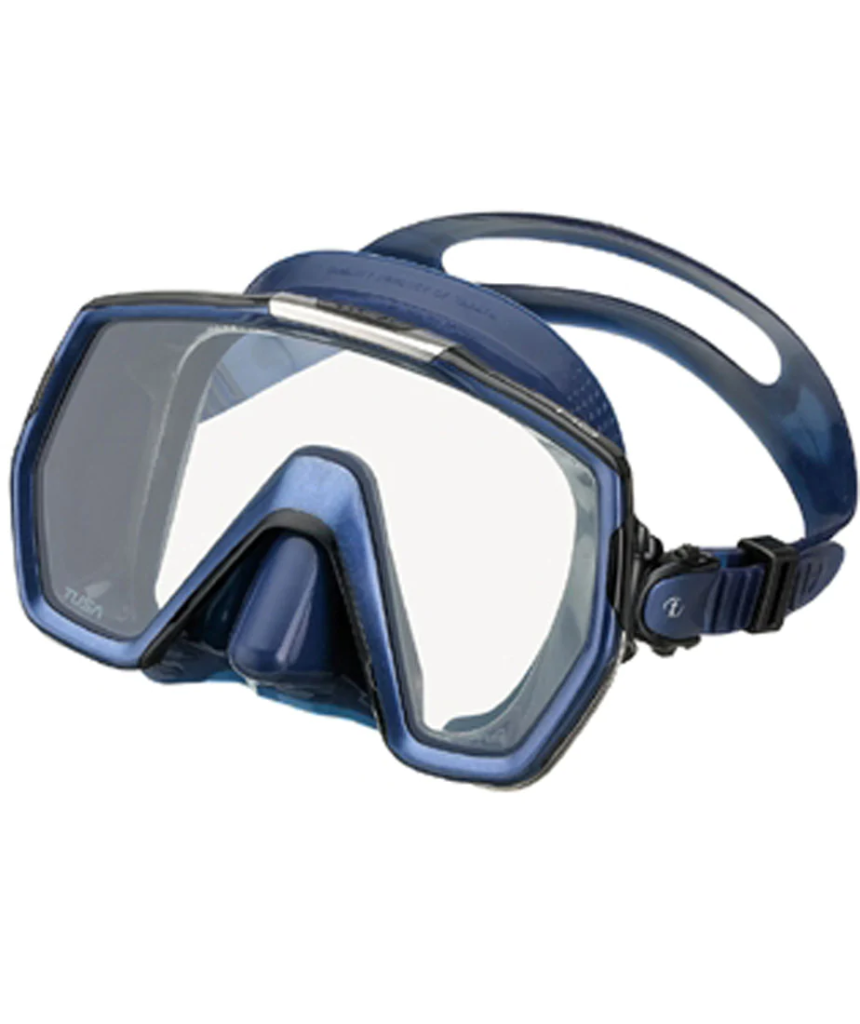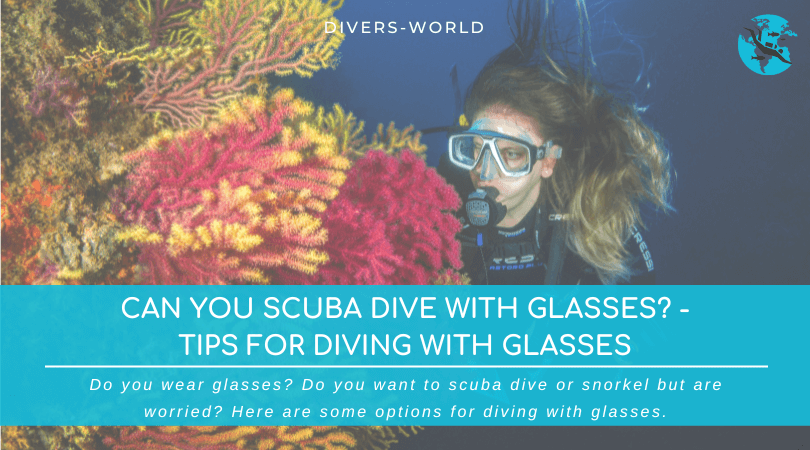Do you wear glasses? Do you want to scuba dive or snorkel but are worried about losing or breaking your glasses? You’re not alone. Many people who wear glasses want to enjoy the underwater world but are hesitant to do so because they don’t want to deal with the hassles of diving with glasses. Luckily, there are a few options and workarounds for people who wear glasses and want to dive.
In this post, we will explore some tips for diving with glasses so that you can enjoy the underwater world without worry.
Table of Contents
Why It’s Important to See Well When Snorkeling and Scuba Diving
It is important to see well when snorkeling and scuba diving because underwater environments are often dark and blurry.
First, you want to be able to take in all the beauty that surrounds you underwater. Second, it is important for safety reasons. If you can’t see well, you might miss something dangerous. Finally, being able to see clearly will help you better enjoy your experience overall.
Can you Snorkel and Scuba Dive with Glasses?
Some people made it possible, but it is not recommended to snorkel or scuba dive with your glasses inside your mask. Most masks will simply not have enough inside volume to fit your glasses, even if you were to take off the temples. These will obviously not fit – they go all the way to your ears. It’s quite clear that diving with glasses does not make sense at all – so let’s have a look at some of the workarounds.
Workarounds for Diving with Glasses: Prescription Diving Mask vs Contact Lenses
Since diving with glasses on is not an option, let’s explore alternatives. In particular, two options emerge: using a diving mask with prescription glasses built in or wearing contact lenses in combination with a normal diving mask.
Diving masks with a built-in corrective lens will give you the best possible vision while diving and are the most comfortable solution – however they are more expensive than normal diving masks.
Instead, you can also wear contact lenses in combination with a normal diving mask. If you wear contact lenses, it is important to clean them thoroughly before and after each dive. Be sure to use fresh water and avoid using salt water, which can dry out your lenses and irritate your eyes. Also, be sure to store your lenses in a clean case when not in use.
Whatever option you go for, here are some other tips for keeping your diving prescription diving masks or contact lenses safe while diving:
- Ensure optimum fit before the dive – underwater is not an ideal place to discover that you cannot see well because your mask does not fit or your lenses are wrong.
- Avoid touching or rubbing your eyes underwater.
- Dive with a buddy who can help you if you need assistance with your mask or lenses.
- Do not attempt to dive if you are not comfortable with wearing corrective devices underwater.
Best Prescription Dive Masks
There are a lot of different prescription dive masks on the market, so it can be hard to know which one to choose. That’s why we’ve put together a list of some of the best prescription dive mask brands and models you can buy online based on our personal experience and customer reviews.
Aqualung

Aqualung is one of the most popular brands when it comes to prescription dive masks. Their masks are known for being comfortable and having a great fit. Aqua Lung also offers a wide range of prescription on its AquaLung Look product line. Whether you need a mask for near-sightedness, far-sightedness, or astigmatism, Aqua Lung has a prescription dive mask that will work for you.
Cressi

Cressi is a great option for those who need a prescription dive mask. The lenses are available in several different options to accommodate different vision needs, and the mask fits snugly to most faces. One very popular mask with the option to add prescription glasses is the Cressi Focus.
Mares

Mares offers a wide variety of styles and designs to choose from, so you’re sure to find one that fits your needs. Their masks are made from high-quality materials and are designed to provide a comfortable, leak-free fit. They offer a wide range of prescription lenses to choose from, so you can find the perfect one for your vision.
Mares X Vision with corrective lenses are easy to adjust and come with a variety of straps and buckles to ensure a secure fit. They also offer a wide range of colors and patterns to choose from, so you can find one that matches your style. If you’re looking for a prescription dive mask that offers style, comfort, and a perfect fit, then Mares is the brand for you.
Sherwood

Sherwood makes some of the best prescription dive masks on the market, and they’re available at a great price point. Whether you need a single-vision or bifocal dive mask, Sherwood has you covered.
Sherwood Corrective Lens dive masks are made with high-quality materials and feature a comfortable fit. They also offer a wide variety of lens options to ensure that you get the perfect vision for your next diving adventure. So whether you’re exploring the Great Barrier Reef or swimming with sharks, Sherwood has the prescription dive mask for you!
Tusa

Tusa masks are known for their comfortable fit and wide variety of lens options. The Tusa Freedom HD Mask is a great choice for diving with glasses. It comes with an easy-to-use diopter dial that lets you quickly adjust the level of correction.
Full-Face Mask: Ocean Reef
Full-face masks may also be an option to consider. Like with regular dive masks, there are models that support prescription glasses. If you’re looking for a top-quality full-face prescription dive mask, our pick is Ocean Reef . Their full-face masks offer superior comfort and visibility thanks to the large viewing window and soft silicone skirt. Plus, the built-in GoPro mount lets you easily attach a camera to capture all your underwater adventures. Keep in mind that you should get training on using a full-face mask first.
Whether you’re a beginner or an experienced diver, Ocean Reef full-face masks are a great option for those who want to see and experience the underwater world in all its glory.
What To Look for When Buying Prescription Dive Mask?
There are a few things to consider when choosing a prescription dive mask.
- First, you need to know your pupillary distance (PD). This is the distance between your pupils, and you’ll need to know this in order to get the correct lenses for your mask.
- Then, you need to decide whether you want a regular mask or a full-face mask. Full-face masks can be a great option if you want to be able to breathe through your nose while diving, but they are more expensive. If in doubt, you can’t really go wrong with a regular dive mask.
- Make sure the modified mask fits well. This is especially important if you’re wearing prescription lenses.
- Look for a style that offers good coverage. You want to see as much as possible.
- Choose a color that suits your needs. Dark/ non-transparent silicone is best if you want to avoid reflections and have more of a tunnel-vision. This allows to concentrate on the things right in front of you. For beginners, a mask with transparent silicone may feel more comfortable as it gives you the impression to see more and allows some peripheral vision. See here for our tips for beginner scuba divers.
- Make sure the lenses are made of durable materials. Saltwater can be tough on the glass, so look for lenses that are scratch-resistant and won’t shatter if they’re hit by a piece of debris.
Once you’ve considered these factors, you can start looking at specific prescription dive masks.
How to Clean Your Prescription Scuba Mask After Diving
Once you have your prescription scuba mask, it’s important to clean it properly after each use. Here’s how:
- Rinse the inside and outside of your mask with fresh water after each dive.
- Use mild soap on the inside of the lens if there is any dirt or grime build-up. Be sure to rinse the soap completely.
- Use a soft cloth to dry both the inside and outside of your mask. Avoid using paper towels, as they can scratch the lenses.
- Store your mask in a cool, dry place out of direct sunlight when you’re not using it.
FAQ
Why is it not recommended to snorkel and scuba dive with glasses?
Wearing glasses while snorkeling or scuba diving is just not very practical. They do not fit into your dive mask, even if you take of the temples this will be challenging. Also, underwater they could move, giving you trouble seeing – you really do not want that underwater. And ultimately, in the worst case your glasses could break inside your mask, which could lead to eye injuries and a bad end of your dive. Therefore, go for one of the alternative options to diving with glasses.
How can I scuba dive with poor eyesight?
There are a few options you can follow to still enjoy the underwater world:
- Invest in prescription goggles. These will allow you to see clearly while keeping your glasses safe on dry land.
- Use contact lenses. If you don’t mind wearing them, contacts are a great option for diving. Just be sure to clean and store them properly after each use.
- Skip the diving altogether (obviously, this is the least preferred option). If you really want to experience the underwater world, consider Sea Aquarium instead. It’s a great way to get up close and personal with fish and other sea life without having to worry about your glasses.
If you are worried about scuba diving with glasses, you could consider snorkeling instead. Check out our guide on snorkeling.
Do people with glasses need to get contacts to go scuba diving or snorkeling?
If you wear glasses and do not have a prescription scuba mask, your only option is contact lenses. You will need to get contacts in order to see clearly underwater. Wearing eyeglasses inside your dive mask is not an option (see above).
Can you dive with prescription swimming goggles?
No, you cannot dive with prescription swimming goggles. They are made for swimming, as the name suggests. Using them for diving could be very dangerous as they are not made to resist the higher pressures that occur once you descend.
Can you scuba dive with contact lenses?
Yes, you can scuba dive with contact lenses, but there are a few things to keep in mind.
- First, be sure to use a reputable brand of contacts, ideally some that are designed for water sports.
- Second, it is important to keep your eyes clean and free of debris while diving, so be sure to rinse your lenses thoroughly before diving.
- Finally, remember to take extra care when removing your lenses after diving, as they will be wet and more susceptible to tearing.
Can you swim with glasses?
Yes, swimming is not a problem – as long as you do not scuba dive with glasses! However, even swimming with glasses can be troublesome.
First, glasses can fog up when they get wet. This can be a problem for instance when you are swimming in cold water.
Second, glasses can slip off your face when you are swimming. This is why it is important to have a good-fitting pair of glasses that will stay on your face.
Third, glasses can get scratched easily. So, it is important to take care not to scratch them and to store them in a safe place when you are not using them.
When you are planning on diving, it is best to leave your glasses at home and use contact lenses or prescription dive masks instead.
Final Thoughts on Diving with Glasses
If you have glasses, you may think that you can’t scuba dive or go snorkeling. However, that is not true! There are many ways to enjoy these activities with glasses.
Let’s summarize our tips for diving with glasses:
- Option 1: Get a prescription diving mask. This is the most comfortable and safest choice you can go with. Period.
- Option 2: Use contact lenses. If you go for this option, follow our recommendations above.
With these tips in mind, you should be able to enjoy diving and snorkeling without any problems.

